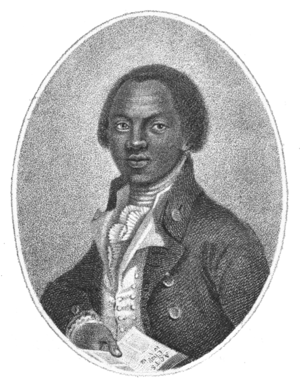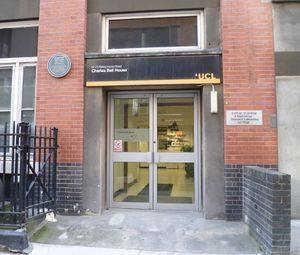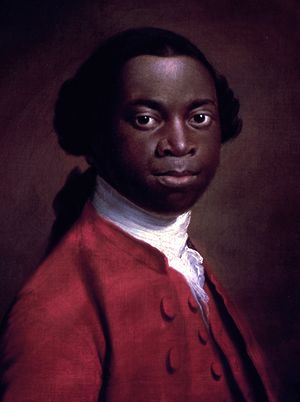أولاودا إكويانو
Olaudah Equiano | |
|---|---|
 | |
| وُلِدَ | ح. 1746 |
| توفي | 31 March 1797 (aged 51–52) |
| أسماء أخرى | Gustavus Vassa, Graves |
| المهنة | Explorer, writer, merchant, abolitionist |
| عـُرِف بـ | Influence over British abolitionists; his autobiography |
| الأنجال | Joanna Vassa and Anna Maria Vassa |
Olaudah Equiano (c. 1745 – 31 March 1797),[3] known in his lifetime as Gustavus Vassa ( /ˈvæsə/),[4] was a prominent African in لندن, a freed slave who supported the British movement to end the slave trade. His autobiography, published in 1789 and attracting attention, was considered highly influential in gaining passage of the Slave Trade Act 1807, which ended the African trade for Britain and its colonies.
Since the late 20th century, there has been some debate on his origins, but most of his account has been extensively documented.[5] His last owner was Robert King, an American Quaker merchant who allowed Equiano to trade on his own account and purchase his freedom in 1766. Equiano settled in England in 1767 and worked and traveled for another 20 years as a seafarer, merchant, and explorer in the Caribbean, the Arctic, the American colonies, South and Central America, and the United Kingdom.
In London, Equiano (identifying as Gustavus Vassa during his lifetime) was part of the Sons of Africa, an abolitionist group composed of prominent Africans living in Britain, and he was active among leaders of the anti-slave trade movement in the 1780s. He published his autobiography, The Interesting Narrative of the Life of Olaudah Equiano (1789), which depicted the horrors of slavery. It went through nine editions and aided passage of the British Slave Trade Act of 1807, which abolished the African slave trade.[6] Since 1967, his memoir has been regarded as the "true beginning of modern African literature".[7]
As a free man, Equiano had a stressful life; he had suffered suicidal thoughts before he became a born-again Christian and found peace in his faith. After settling in London, in 1792 Equiano married an English woman named Susannah Cullen and they had two daughters. He died in 1797 in London; his gravesite is unknown. Equiano's death was recognized in Britain as well as by American newspapers.[8] Plaques commemorating his life have been placed at buildings where he lived in London. Since the late 20th century, when his autobiography was published in a new edition, he has been increasingly studied by a range of scholars, including many from Nigeria.
Memoir

Marriage and family

See also
- Ottobah Cugoano, an African abolitionist active in Britain in the late 18th century
- Phillis Wheatley, recognized in the eighteenth century as the first African-American poet; first African-American woman to publish a book
- List of slaves
المراجع
- ^ According to Philip D. Curtin: "There is an Ashaka village group in the Aboh division, but this is on the Ase River and anyone brought up there must have been familiar with water and Olaudah was not" (Philip D. Curtin Africa Remembered; Narratives by West Africans from the Era of the Slave Trade, University of Wisconsin Press, p. 64).
- ^ خطأ استشهاد: وسم
<ref>غير صحيح؛ لا نص تم توفيره للمراجع المسماةCarretta 365 - ^ "Olaudah Equiano". BBC History.
- ^ خطأ استشهاد: وسم
<ref>غير صحيح؛ لا نص تم توفيره للمراجع المسماةlovejoy - ^ It is likely Olaudah was from the ancient Igwedom of Onitsha (Onicha Ado N'idu) "Olaudah Equiano (c. 1745-1797), Historical Figures, BBC, 2014, accessed 28 September 2014.
- ^ Equiano, Olaudah (1999). The Life of Olaudah Equiano, or, Gustavus Vassa, the African. Mineola, N.Y.: Dover Publications. ISBN 0-486-40661-X.
- ^ O. S. Ogede, "'The Igbo Roots of Olaudah Equiano' by Catherine Acholonu", Africa: Journal of the International African Institute, Vol. 61, No. 1, 1991, at JSTOR (يتطلب اشتراك)
- ^ "DEATHS: In London, Mr. Gustavus Vassa, the African, well known to the public for the interesting narrative of his life."] Weekly Oracle (New London, CT), 12 August 1797, p. 3.
للاستزادة
- The Interesting Narrative of the Life of Olaudah Equiano, or Gustavus Vassa, the African at Wikisource.
- For the history of the Narrative's publication, see James Green, "The Publishing History of Olaudah Equiano's Interesting Narrative," Slavery and Abolition 16, no. 3 (1995): 362-375.
- S. E. Ogude, "Facts into fiction: Equiano's narrative reconsidered", Research into African Literatures, Vol. 13, No. 1, 1982
- S. E. Ogude, "Olaudah Equiano and the tradition of Defoe", African Literature Today, Vol. 14, 1984
- James Walvin, An African's Life: The Life and Times of Olaudah Equiano, 1745-1797 (London: Continuum, 1998)
وصلات خارجية
- Frederick Quinn, "Olaudah Equiano", Dictionary of African Christian Biography, article reproduced with permission from African Saints: Saints, Martyrs, and Holy People from the Continent of Africa, copyright © 2002 by Frederick Quinn, New York: Crossroads Publishing Company
- Olaudah Equiano, or Gustavus Vassa, the African, Brycchan Carey website, Carey 2003–2005. Includes Carey's comprehensive collection of resources for the study of Equiano. The Nativity section [1] includes a detailed comparison of differing data related to his place of birth.
- The Equiano Project, The Equiano Society and Birmingham Museum & Art Gallery
- Part I: "Olaudah Equiano", Africans in America, PBS
- "Historic figures: Olaudah Equiano", BBC
- أعمال من Olaudah Equiano في مشروع گوتنبرگ
- Works by or about أولاودا إكويانو at Internet Archive
- Works by أولاودا إكويانو at LibriVox (public domain audiobooks)

خطأ لوا في وحدة:Authority_control على السطر 278: attempt to call field '_showMessage' (a nil value).
- صفحات تحتوي روابط لمحتوى للمشتركين فقط
- Pages with empty portal template
- مواليد 1745
- وفيات 1797
- Black British former slaves
- Black British politicians
- Black British writers
- British abolitionists
- British evangelicals
- Converts to Christianity from pagan religions
- British autobiographers
- English people of Igbo descent
- Igbo former slaves
- Igbo writers
- People who wrote slave narratives
- Writers of captivity narratives
- 18th-century Nigerian people